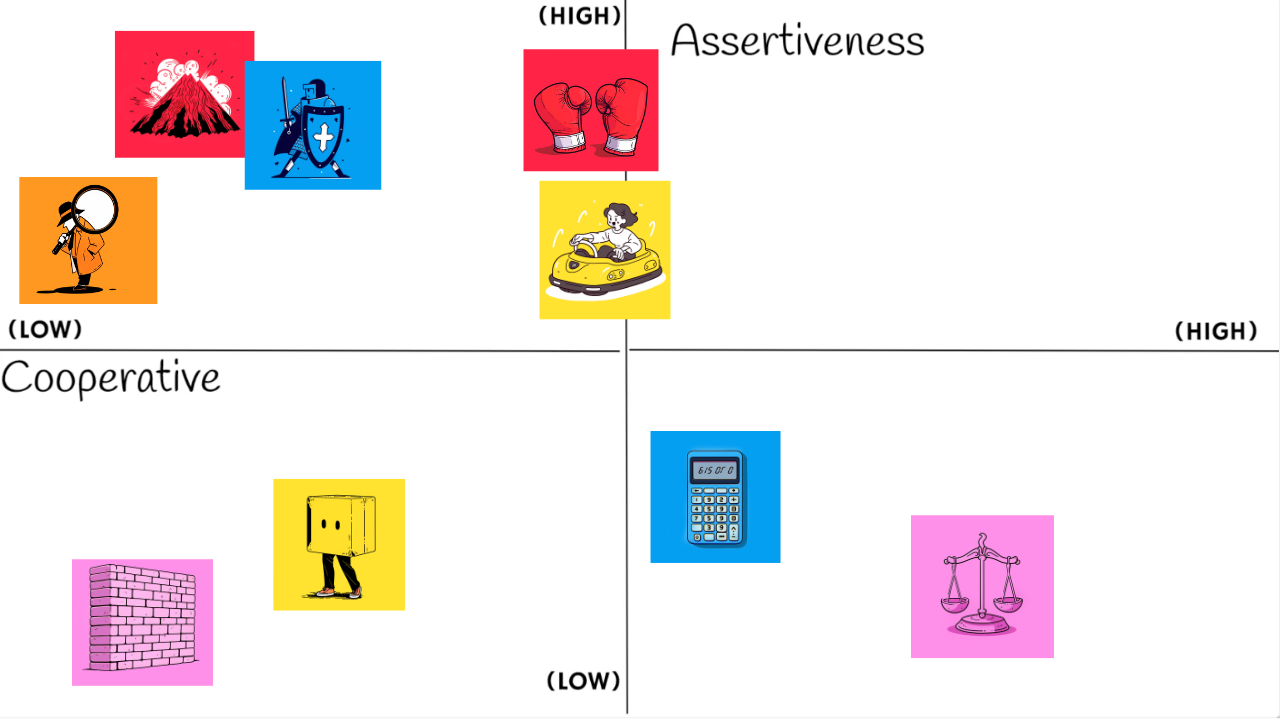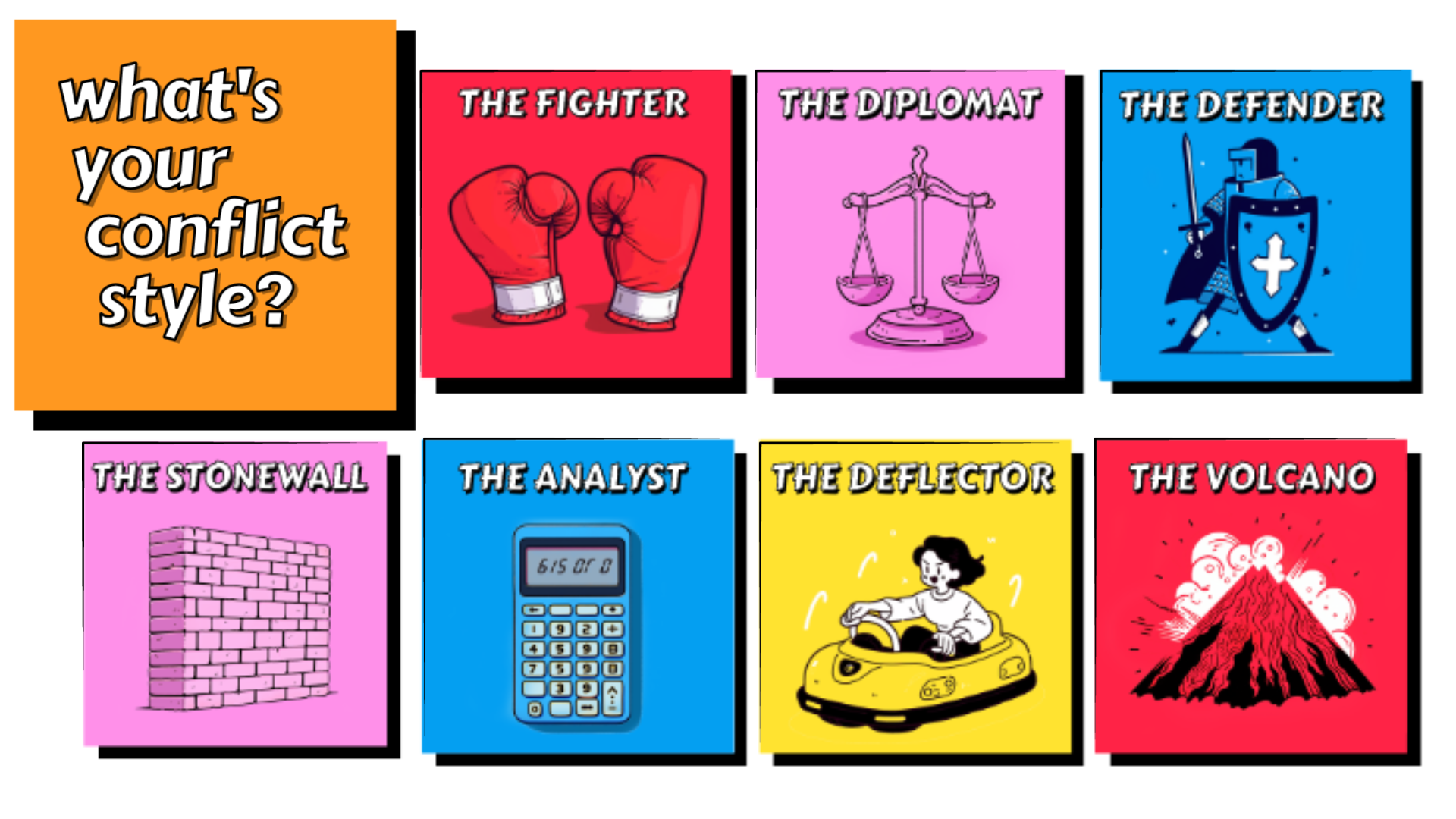The Conflict Style Test for Your Relationship
Sep 26, 2023
If you're struggling with conflict in your relationship, you're not alone. All couples face conflicts and disagreements at some point. The key to a healthy and thriving relationship lies in how you handle these conflicts. Understanding your conflict style and that of your partner can make a world of difference in resolving issues and strengthening your bond.
You can take our conflict style quiz here
What are the different types of conflict styles?
The Thomas-Kilman Model of Conflict consists of four quadrants that come out of two axis. The first axis is the assertiveness axis, which represents how much you prioritize your own needs and concerns in a conflict. On one end of the spectrum, you have those who are highly assertive and prioritize their own needs above all else. On the other end, you have those who are less assertive and tend to prioritize the needs of others.
The second axis is the cooperativeness axis, which represents how much you prioritize the needs and concerns of others in a conflict. On one end, you have those who are highly cooperative and are willing to sacrifice their own needs for the sake of others. On the other end, you have those who are less cooperative and prioritize their own needs over the needs of others.
Based on these two axes, the Thomas-Kilman Model identifies five conflict styles:
1. Avoiding: This conflict style involves avoiding or ignoring the conflict altogether. People who use this style often prefer to keep the peace and may feel uncomfortable or anxious when confronted with conflict. While avoiding can temporarily alleviate tension, it may lead to unresolved issues and resentment if not addressed properly.
2. Accommodating: Accommodators prioritize maintaining the relationship and are willing to sacrifice their own needs and desires to please others. They may give in to the other person's demands or opinions, even if it means compromising their own values. While accommodating can be a useful conflict style in certain situations, repeatedly doing so without addressing personal concerns can lead to feelings of being taken advantage of or not being heard.
3. Competing: Competitors adopt a win-lose approach to conflict, focusing on their own needs and desires at the expense of others. They may use aggressive tactics, such as asserting dominance or manipulation, to get their way. While competing can be effective in some situations, it can damage relationships and create a hostile environment if not balanced with cooperation and compromise.
4. Collaborating: Collaborators seek win-win solutions by actively listening, empathizing, and finding mutually beneficial solutions. They prioritize open communication, understanding, and finding common ground. The Collaborating conflict style allows for both parties to express their needs and concerns while working together to find a resolution that satisfies everyone involved. This style can foster trust, and respect, and strengthen the relationship.
5. Compromising: Compromisers aim to find a middle ground by both parties making concessions. They are willing to give up some of their own needs and desires in order to reach a resolution. Compromising can be a practical conflict style when time is limited or when the issue at hand is not of high importance. However, relying too heavily on compromising without addressing underlying concerns can lead to unresolved issues and future conflicts.

What is the purpose of a Conflict style test?
Conflict style tests and assessments serve the purpose of helping individuals gain a better understanding of their personal approach to conflict and how it may impact their relationships. A test or a quiz assess various conflict styles and provides valuable insights into one's natural tendencies and preferences when it comes to dealing with disagreements or conflicts.
The primary purpose of a conflict style test is to promote self-awareness and improve communication skills. By identifying and understanding our preferred conflict resolution style, we can become more conscious of our own behavior during conflicts and better equipped to navigate and resolve them effectively.
Furthermore, conflict style tests can help individuals recognize and appreciate the diversity of conflict resolution approaches. Different people have different ways of handling conflicts, and being aware of these differences can foster empathy, understanding, and empathy in relationships.
Additionally, conflict-style tests can highlight areas for personal growth and development. They can reveal any ineffective or destructive patterns of behavior that may be hindering the resolution of conflicts. Armed with this knowledge, individuals can then work towards adopting more constructive and productive conflict resolution strategies.
Ultimately, the purpose of a conflict style test is to empower individuals to enhance the quality of their connections and improve their relationships. By gaining insights into their own conflict resolution style, individuals can develop the necessary skills and strategies to navigate conflicts in a healthier and more satisfying manner, leading to stronger and more fulfilling relationships overall.
How Does A Conflict Style Quiz Help.
A conflict-style quiz will assess you along the two scales of the TKI and give you a score that puts you in one of the quadrants. This is educational and helpful for an analysis of how you handle conflict and what skilsl you need to improve conflict management.
If you want to learn more, please check out the Conflict Compass an online course from My People Patterns that will help you understand and unpack relationship dynamics from a family systems perspective.
The Coulse Therapy West Hollywood Institute for Relationships


